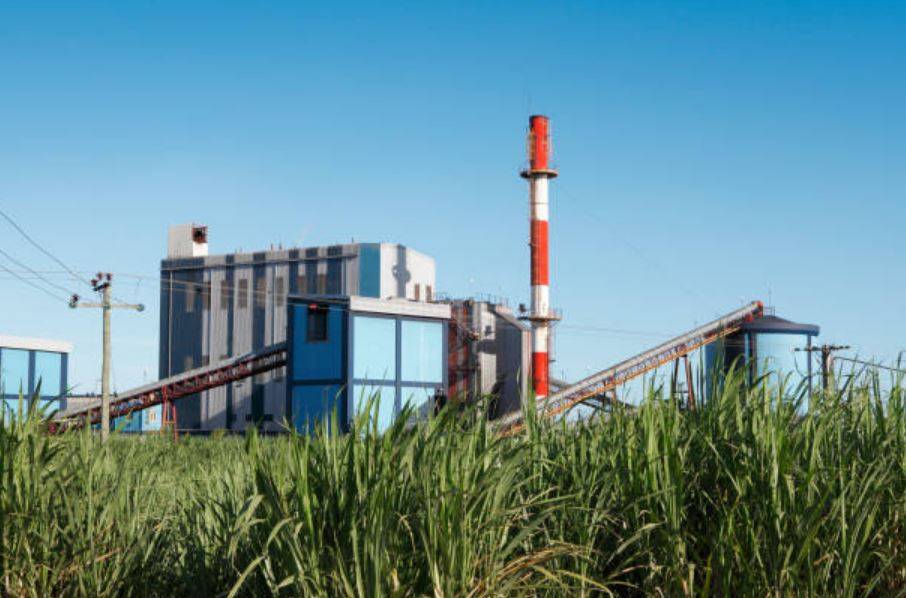 Gonda will have a new sugar mill, but it won’t produce sugar; instead, it will convert the entire juice from cane into ethanol for blending with gasoline. Balrampur Chini Mills Ltd is constructing a factory in Maizapur, Gonda district’s Colonelganj tehsil, at a cost of Rs 450 crore.
Gonda will have a new sugar mill, but it won’t produce sugar; instead, it will convert the entire juice from cane into ethanol for blending with gasoline. Balrampur Chini Mills Ltd is constructing a factory in Maizapur, Gonda district’s Colonelganj tehsil, at a cost of Rs 450 crore.The 200-acre site, where construction is already underway, already houses a mill capable of crushing 3,000 tonnes of cane per day (tcd). That mill will be demolished to make way for India’s largest single-tandem and multiple-feedstock distillery, with a capacity of 343 kilolitres per day.
“It’s a new 4,000-tcd plant that can also process 800 tonnes of grain and 1,100-1,200 tonnes of molasses per day when cane isn’t available.” During the crushing season (November-April), we will use cane for 150-160 days, stored molasses (mostly from the company’s other mills) for 50-60 days, and broken rice (mostly from the open market) for another 140-150 days. In this manner, unlike a regular sugar mill, it can operate for 350 days of the year,” explained Sandeep Agarwal, unit head at Maizapur.
Game-changer for Sugarcane Farmers
The new mill has the potential to change the game for sugarcane farmers in Gonda and the rest of Uttar Pradesh. Its success will pave the way for ganna to evolve into a full-fledged energy crop. India is currently producing more sugar than it consumes, with an annual production of 31-32 million tonnes exceeding domestic consumption of 25-26 million tonnes.
Diverting cane juice for bio-fuel, i.e. ethanol, which is now blended up to 10% in gasoline, would result in mills accumulating fewer sugar stocks, making it easier for them to pay growers.
“Donon ko faida hoga ethanol plant se donon ko faida hoga.” “Unka maal jaldi bik jayega aur hamara ganne ka payment bhi tez hoga (the ethanol plant will benefit both the company and us; they will be able to sell their product faster and pay us faster),” said Rang Bihari Singh, who grows cane on 20 of his total 30-bigha (6 acre) holding in Colonelganj’s Ashokpur village. The Maizapur mill obtains cane from over 20,000 farmers who cultivate the crop on approximately 35,000 acres.
Every quintal (100 kg) of crushed cane yields approximately 11.5 kg of sugar in a standard mill. The unrecoverable sugar is converted into ‘C’ molasses, which accounts for 4.5-4.7 percent of the cane. At a recovery rate of 22-23 percent, the corresponding ethanol production from ‘C’ molasses would be 1-1.1 litres. Alternatively, the mill could produce only 9.5-9.6 kg of sugar and divert the extra sucrose to an earlier stage of ‘B-heavy’ molasses, accounting for 6.5-6.8 percent of cane. The ethanol production is higher at 32-33 percent recovery, at 2.1-2.2 litres.
The new Maizapur plant will not make a single kilogramme of sugar from cane. After crushing, the entire juice will be concentrated to produce cane syrup with a solids content of approximately 60%. This syrup is then fermented to produce 8-8.2 litres of ethanol per quintal of cane.
The Narendra Modi government has set a higher price of Rs 63.45 per litre for ethanol produced directly from cane juice/syrup than for ethanol produced from ‘B-heavy’ molasses (Rs 59.08/litre) and regular ‘C’ molasses (Rs 46.66/litre). The higher rate is intended to compensate mills for revenue lost due to reduced/no sugar production.





